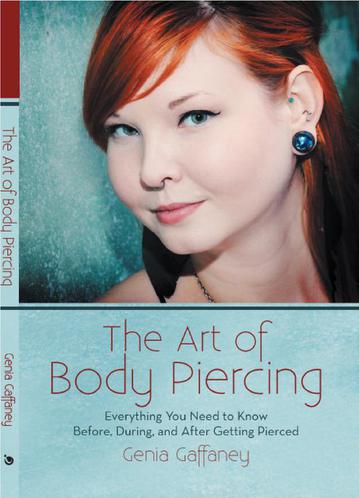The Art of Body Piercing
How To Choose A Piercing Shop
By Genia Gaffaney
You have decided to get a piercing, but where do you go? How do you choose which piercing shop to get pierced at? Ask your friends where they got pierced. Did they have a good experience? Do they recommend the shop? I am still surprised by the number of people who go to a piercer when they have heard negative comments about the piercer or the shop. Some people have a negative experience but then return to the same studio for another piercing. Many people make the decision based on price, then end up paying someone else to re-pierce them. Time and money can be saved by doing your research so you don't end up with a piercing you are not satisfied with and have to pay another shop to re-do the piercing. Being patient and knowing the right questions to ask, can save you a lot of frustration and enable you to have the best piercing experience possible.
When you are ready to get a piercing, talk to your friends to see where they got pierced at, visit piercing studios, and keep in mind that you do not have to get pierced that day. Make time to do your research! Go to several shops and look around. Ask yourself: Is it clean? Is the staff friendly and knowledgeable? Trust your instincts: do you feel comfortable there? Ask about sterilization: do they use an autoclave to sterilize their needles? How do they sterilize their jewelry? Ask if the piercing shop autoclaves their tools. Tools that are used in piercing have blood on them, and it is crucial that they are put through an autoclave to be sterilized. Does the piercing shop use only medical-grade jewelry? Do they use the needles only one time? It makes me sick to my stomach that you would even have to ask that question, but I have heard of a piercer who used the same needle on three sisters while their Dad watched instead of pulling his girls out of there! It's okay to stand up and say, "I don't want to be pierced here, I've changed my mind. Please give me my money back because I'd like to leave!" Be sure to ask if they reuse their jewelry. There are shops out there that allow their customers to trade in the jewelry they were pierced with, then they autoclave and reuse that jewelry on other customers. Piercing jewelry is being inserted into your body and you are paying a premium price for your piercing: the jewelry should be new.
The piercing shop should have a current certificate proving they had a spore test done on their autoclave and the certificate should be posted in the shop. Some states require it yearly, some require it monthly, so the state law on this will vary, but it is very important that a current certificate is available to ensure what is going into the autoclave actually comes out sterilized.
Another good question to ask is how the piercing is done, specifically, do they use a clamp? There are two methods of piercing: 1) with a clamp and 2) freehand piercing. I prefer and always recommend freehand piercing. We repeatedly have customers who were pierced with a clamp tell us that the clamp hurt more than the piercing and sometimes caused bruising. Many piercers will put a rubber band around the clamp, which causes unnecessary pressure on the area being pierced: because by using a rubber band, they can't control the pressure of the tool. If the correct amount of pressure is applied using a clamp or Tuttle tweezer (for lip, tongue, and tragus piercings), meaning the pressure is controlled by the piercer, not with the use of a rubber band or by locking the clamp, the customer should not feel the effect of the tool. A clamp should not be used in piercings except for tongue, lip and tragus; and for those piercings the Tuttle tweezer is preferred over the clamp because it is not possible for it to lock onto a piercing like a clamp.
Be sure to ask how long the piercer has been working or how many piercings they have done. Keep in mind that even if a piercer is fairly new, they will still be a good piercer if they received good training. We have had piercers from other shops tell us that their training and apprenticeship consisted of them watching another piercer for one week, and then they started piercing with no supervision. Feel free to ask piercers what their training involved and how long it lasted.
Ask if you will receive written care instructions and care solution with your piercing. Do you get to pick out the jewelry you will be pierced with? Some shops have a selection of jewelry to choose from and others choose for you. Most customers have no idea what gauge, length, or diameter they should be pierced with. They rely on the expertise of the piercer or the staff at the studio to choose the right size for them. We have seen countless nose piercings with gigantic nose screws. These people usually say that was all the piercer had, but they went through with the piercing even though they did not like the jewelry, and they were unhappy with it afterward.
It's common to see piercing studios carry only basic body piercing jewelry, which is surgical steel with steel beads; this is the least expensive jewelry for a piercer to purchase. Most people prefer to start out with jewelry that has stones on it, so it looks good to them, and they are willing to pay extra for the jewelry they like. Some customers are allergic to surgical steel and require medical grade titanium. If there is no choice or if you do not like the jewelry, move on to the next shop. If the studio is too cheap to carry a variety of piercing jewelry, they may also be too cheap to provide you with a quality piercing. It is very important for the studio to provide a selection of medical-grade piercing jewelry other than surgical steel, because as mentioned above, some people have certain metal allergies that need to be taken into consideration. Different types of medical-grade jewelry should include titanium, 14 kt gold, polycarbonate, and Bioflex, as well as surgical steel.
Some shops offer very inexpensive piercings; if the price of the body piercing is incredibly cheap, you need to ask yourself why. Keep in mind that this piercer is going to be putting a needle through your body - are you sure you want the cheapest piercing in town?
I cannot emphasize enough the importance of doing your research. Do not be in such a hurry to get pierced that you go to any shop that is available. Make sure you choose a good place to be pierced.
When you do make the decision of where you will be pierced, be sure you are comfortable with the entire process, from start to finish. If at any time you are uncomfortable with your piercer or the environment of the piercing shop, or if you feel the piercing is not being performed in a sterile manner, stand up, ask for your money back, and leave. You do not need to sit through a piercing you are having second thoughts about because you do not want to hurt somebody's feelings; you are never going to see this piercer again. You need to ask yourself what is more important, the piercer's feelings or your body and well-being?
Questions to ask when looking for a piercing studio:
• Do they autoclave their needles?
Do they autoclave their needles?
• Are needles used only once and disposed of?
Are needles used only once and disposed of?
• Do they autoclave their tools?
Do they autoclave their tools?
• Are regular spore tests done on the autoclave and is the certificate available to view?
Are regular spore tests done on the autoclave and is the certificate available to view?
• How is the jewelry sterilized?
How is the jewelry sterilized?
• Do they use new, medical-grade jewelry?
Do they use new, medical-grade jewelry?
• Do you get to choose your jewelry?
Do you get to choose your jewelry?
• Do they offer jewelry other than surgical steel?
Do they offer jewelry other than surgical steel?
• Do they pierce freehand or with a clamp?
Do they pierce freehand or with a clamp?
• Will you receive written care instructions?
Will you receive written care instructions?
• What is recommended for aftercare and will you receive care solution or is it available to purchase?
What is recommended for aftercare and will you receive care solution or is it available to purchase?
• How long has the piercer been piercing and/or how many piercings have they done?
How long has the piercer been piercing and/or how many piercings have they done?
• Who trained them and how long was their training?
Who trained them and how long was their training?
• Is licensing required by the state or county, and if so, are the licenses posted to view?
Is licensing required by the state or county, and if so, are the licenses posted to view?
Genia Gaffaney, author of The Art of Body Piercing and owner of Silver Safari, with locations in Spokane and Seattle, Washington, began body piercing in 2000. She has performed over 7,500 body and ear piercings and has overseen thousands more. Her stores have done over 90,000 body and ear piercings.
Genia Gaffaney
Owner, Silver Safari
Licensed Body Piercer
Certified Tattoo Removal Technician
Author, The Art of Body Piercing

